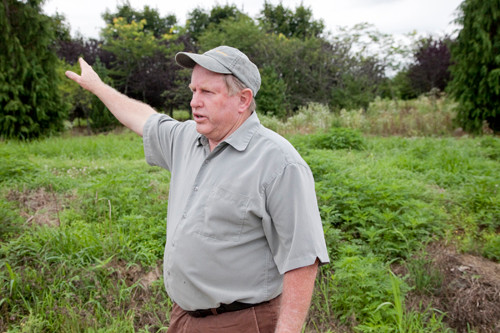
Shrubs, weeping Alaskan cedar trees, red mammoth clovers and a dirt road populate this lot at the corner of routes 102 and 2 in North Kingstown. To passersby, the property appears just a natural extension of Schartner Farms to the south. But for the land’s owner, the 20-acre lot represents a land-preservation concept never realized.
Two years after closing on the parcel, owner Richard “Rit” Schartner warns that rather than farmland, the lot could host homes or a commercial strip mall, in contradiction with community desires. Why? Schartner cannot find anyone to buy the development rights to provide money he says he desperately needs to pay the mounting costs of purchasing the land and an adjoining 120 acres.
These, however, are no typical development rights that a nonprofit or government scoops up in return for placing restrictions on future land use. At the urging of local officials, the Schartner family became the guinea pig for transferrable development rights.
On paper, the concept is relatively simple. A buyer of land envisioned as open space, forest or farmland purchases the property at full market price. Town ordinances then allow the buyer to sell – piecemeal or as a whole – the development rights to a developer of another project elsewhere. That developer uses those rights to build a more densely packed project than typically allowed. Supporters say the concept swaps private money for public money while helping communities steer commercial and residential development to designated areas.
While state law has long enabled communities to set up systems for transferring rights, only North Kingstown has a law on its books. And only Schartner Farms has attempted to sell the rights on the open market. No one has bitten, which has led the family to consider selling the land and putting its other properties up for sale.
“We hope not to develop it,” Schartner said. “But we also don’t want to go broke.”
Schartner says his family spent $7.4 million to purchase a 140-acre parcel from Bald Hill Nurseries in December 2008. Schartner says his costs have mounted since then and total more than $10.5 million when legal fees and interest payments are included.
The family sold the development rights to 120 acres to the R.I. Department of Environmental Management. But it rejected an offer from DEM to sell the rights for the remaining 20 acres. Schartner says he feared the conditions the agency would place on the land would not allow flexibility to use the land for evolving agricultural uses as consumer demands change.
So North Kingstown proposed transferrable development rights. Schartner said he liked the concept and continues to support it in principle. But he says the town fumbled on execution. North Kingstown designated the Schartner land as an area where rights could be sold. Exeter and North Kingstown later agreed that the rights from the 10 acres of the property in Exeter could be sold for development in North Kingstown.
A study estimated the rights – divided into 400 units – could fetch $4 million in all. And Schartner was prepared to wait, saying he would not sell the rights until 2011 and understood it could take decades to sell them all.
Officials imagined those rights going to developers building along Post Road, where the town is bringing sewers, a necessary step for major development. Schartner, however, says the town made a mistake by relaxing zoning requirements so much in the Post Road area that developers hold no desire for Schartner’s rights. He points to a developer who about two months ago proposed more than 500 homes in the area. When Schartner asked him if he wanted to buy rights from the farm, the developer said no.
“There is no market,” Schartner said. “It’s not just because of the economy.”
Maybe it would help if the program expanded beyond North Kingstown borders, Schartner said. Maybe a developer wanting to construct something in Providence would buy his rights.
But regionalizing the program appears far away, said Sheila Brush, director of programs at Grow Smart Rhode Island.
“In my mind it’s too complex of a program to say wholesale we’re just going to put it in place statewide,” Brush said. “I think it’s something that needs to be thought out very carefully.”
The Schartner Farm situation, she said, should also not be portrayed as a failure of the concept. The economy is weak, and the real estate market even weaker.
“If the market were really hot, it would be entirely different,” she said.
North Kingstown Planning Director Jon Reiner didn’t immediately return calls seeking comment.
To find ways to tweak the program, the R.I. Division of Planning awarded a $51,000 grant to the Washington County Regional Planning Council. The council plans to look at some of the legal obstacles to establishing the program in individual communities and on a regional basis. It will also arrange informational sessions about the concept for local planning boards as well as city and town councils.
Jeff Broadhead, the council’s executive director, said communities should not give up on the concept just yet.
“It’s a new market,” he said. “Until it becomes a little bit mature it is going to be a little slow, and it is going to be hard.”
Schartner says he has run out of time to wait for a market to materialize. And he’s frustrated that Exeter has sued to block the construction of an access road to his corner property. Without the road, the property becomes less valuable for a commercial buyer.
So about eight months ago, he started assembling a team of lawyers and public relations personnel to put pressure on Exeter and publicize his troubles with transferable development rights. And he says if things don’t improve, he may move more operations to a farm he owns in New Hampshire.
“Our heritage is Rhode Island. We like Rhode Island,” Schartner said. “But it’s just been too long.” •












